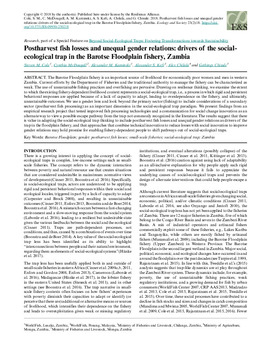Postharvest fish losses and unequal gender relations: drivers of the social-ecological trap in the Barotse Floodplain fishery, Zambia

Citation
Cole, S.M. et al. (2018). Postharvest fish losses and unequal gender relations: drivers of the social-ecological trap in the Barotse Floodplain fishery, Zambia. Ecology and Society, 23(2): 18
The Barotse Floodplain fishery is an important source of livelihood for economically poor women and men in western Zambia. Current efforts by the Department of Fisheries and the traditional authority to manage the fishery can be characterized as weak. The use of unsustainable fishing practices and overfishing are pervasive. Drawing on resilience thinking, we examine the extent to which the existing fishery-dependent livelihood context represents a social-ecological trap, i.e., a process in which rigid and persistent behavioral responses are applied because of a lack of capacity to adapt, leading to overdependence on the fishery, and ultimately, unsustainable outcomes. We use a gender lens and look beyond the primary sector (fishing) to include considerations of a secondary sector (postharvest fish processing) as an important dimension in the social-ecological trap paradigm. We present findings from an empirical research project that tested improved fish processing technologies and a communication for social change innovation as an alternate way to view a possible escape pathway from the trap not commonly recognized in the literature.
Permalink
Link to PDF
Date Available
Type
Publisher
Countries
ISSN
1708-3087
Research Themes
Language